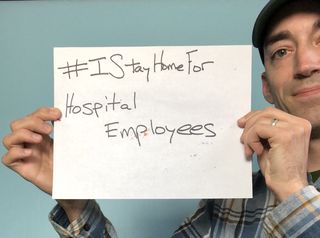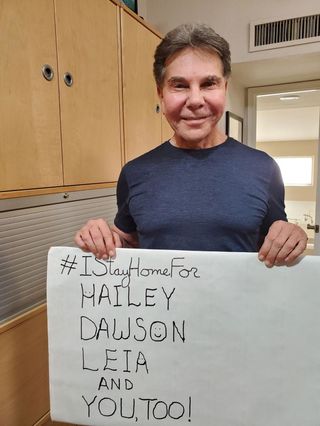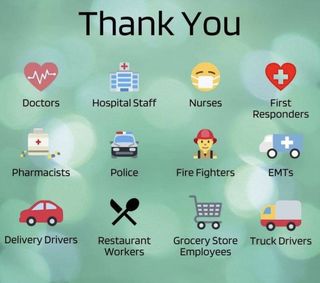Coronavirus Disease 2019
3 Magic Words for the Coronavirus Crisis
How to cope, help, and influence millions of people to stay home.
Posted March 25, 2020
In times like this, sometimes it's best to focus on the timeless.
The human brain isn't exactly timeless, but it takes evolution thousands of years to make even minor tweaks to the system. It's pretty safe to say that today, the brain is still wired the same way that it was when I wrote Magic Words in 2014—as it has been for all of recorded history.
The seven psychological principles, each packaged neatly into a single "magic" word, are needed now more than ever. The following three will help you to help others more effectively, cope with what's going on, appreciate more those who deserve it, and maybe even influence millions of people to stay at home.
Magic Word #1: "Because"
Obeying blindly is not in our nature. Leaders who are imploring citizens to "listen to the experts" might as well not be saying anything at all. People won't stay home just because someone told them to.
Yes, "authority" is one of Robert Cialdini's six principles of influence, but you have to recognize that person as an authority—and you must recognize them as an authority in that area of your life. Your doctor's medical advice? You'll trust that. But when you need advice about parenting, finances, or fantasy football lineups, there are better people to go to than your doctor.
In the age of social media influencers, everyone is picking and choosing their own individual authority figures. Authority is becoming increasingly fragmented. Sometimes that new authority figure is ourselves. After all, who is the authority over when we leave our own homes?
We are.
This is why "because" beats authority in 2020.
But people need a damn good "because" if they are going to upend their entire lives, routines, and income-producing activities.
And what's the best because for that? Their own because.
So leaders, my advice to you is this. Find out what every individual person's "because" is, then tell them to stay home because of that.
Impossible? Impractical? Maybe not.

If only a prominent social influencer would post a picture of themselves with their "because," then challenge a handful of others to do the same, we could start something similar to the ice bucket challenge. Something that might spread fast enough to slow the spread of the virus.
A quick Google search surprised me: Kevin Bacon already did this. He did better than a photo. He posted a video (and notice all the "becauses" while he speaks.)
He created a hashtag, #IStayHomeFor (in this usage, "for" is a synonym for "because"). And he challenged other influencers to do the same.

It's working. Here's my because...
Even Robert Cialdini himself got in on the action, stating in a LinkedIn post, "Smart use of Social Proof and Commitment and Consistency. And a good idea for us all."
Magic Word #2: "Help"
Why are we so hesitant to ask for help? Well, it's not exactly a mystery. We don't want to put others out. We don't want to appear selfish, needy, or incapable. We don't want to feel awkward. Or we believe that other people need help more than we do.
Ironically, there are millions of people who would love nothing more than to be able to help. They have the means and the energy. They just need direction.
A few days ago, I saw a post on my local community's Facebook page. "Do you have an extra shelving unit hanging around?" A local charitable organization needed to organize all the "food, TP, and cleaning products we are getting in to help people."

I did. One that I wasn't using at all. I gave it to her.
So, was she putting me out? Absolutely not. Did she appear selfish, needy, or incapable? Of course not. Her message wasn't: "Help me." It was: "Help me to help others." Did she feel awkward? I hope not. It feels good to help. The opposite, feeling helpless, is torture.
During this crisis, let's not rob one another of our deep, hardwired desire to help each other simply because we feel a little awkward in the asking.
Of course, when someone does help us, there's a magic word for that too. One your mother probably taught you...
Magic Word #3: "Thanks"
We should all not only feel an unreasonably high level of gratitude for our first-responders and caretakers. We should also express that gratitude in a way that's big enough to make them feel like all their extra personal risk was worth it. We should also be thankful for our friends, employees, co-workers, educators, family members, and even the people we're stuck in the house with. If you use only one of the magic words on this shortlist, then make it "thanks."

Here are five ways to make sure that your "thanks" makes someone actually feel appreciated:
1. Be timely. If possible, don't wait until this is all over. Show your appreciation now. It's never too late, but sooner is better.
2. Compliment their attributes. What is it about them that you appreciate? Their generosity? Their selflessness? Their creativity? Let them know.
3. Recognize their intent. Examples: "I'm amazed how, during a time of stress, you still wanted to serve others." "I know that you were trying to help."
4. Recognize the cost. Show that you understand what they sacrificed in order to help you. Money donated to a charity could have been spent on something else. Health care workers are sacrificing their own health.
5. Articulate the benefits. Seeing the photo of the shelves I donated in action put a warm spot across my heart. Show people how they've helped and the impact their actions had on others, and they'll be happy to do it all over again.
For example, if you shared this article, I might say, "Thank you for sharing this. Reading it to the end shows that you're a thoughtful person. Because you shared, I know that you care about others and want them to benefit from something in the article. You could have been doing anything else with your time, so I appreciate the fact that you're here right now. Every time that little number next to the 'share' button goes up by one, that means someone else has been reached with this message of hope, help, and gratitude. Three things we need now more than ever. Thank you."
So, will you please "help" to get the word out about this article by sharing it? "Because" we need all the magic we can get right now. "Thank you."
Stay healthy and stay connected, everyone. We truly are in this together.




